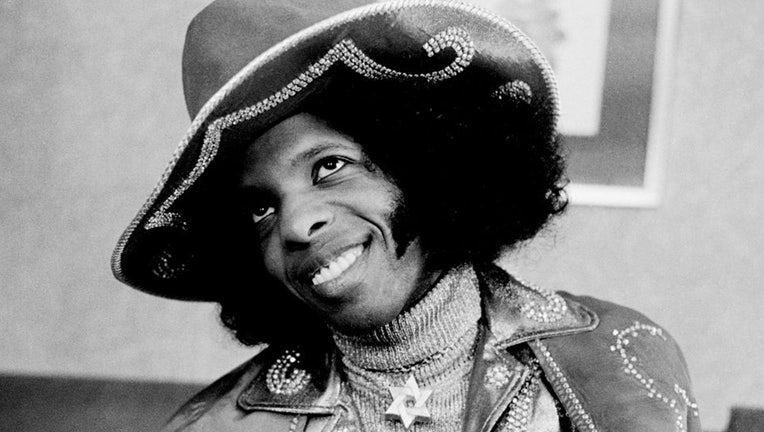Sly Stone, frontman of Sly and the Family Stone, dies at 82

FILE - Sly Stone of Sly And The Family Stone posed in London on 16th July 1973. (Photo by Michael Putland/Getty Images)
Sly Stone, the frontman of legendary band Sly and the Family Stone, has died. He was 82.
Stone, born Sylvester Stewart, had been in poor health in recent years. His publicist Carleen Donovan said Monday that Stone died surrounded by family after contending with chronic obstructive pulmonary disease and other ailments.
Sly and the Family Stone transformed popular music in the 1960s and ’70s and beyond with such hits as "Everyday People," "Stand!" and "Family Affair."
Sly and the Family Stone
The backstory:
Formed in 1966-67, Sly and the Family Stone was the first major group to include Black and white men and women, and well embodied a time when anything seemed possible — riots and assassinations, communes and love-ins. The singers screeched, chanted, crooned and hollered. The music was a blowout of frantic horns, rapid-fire guitar and locomotive rhythms, a melting pot of jazz, psychedelic rock, doo-wop, soul and the early grooves of funk.
No band better captured the gravity-defying euphoria of the Woodstock era or more bravely addressed the crash which followed. From early songs as rousing as their titles — "I Want To Take You Higher," "Stand!" — to the sober aftermath of "Family Affair" and "Runnin’ Away," Sly and the Family Stone spoke for a generation whether or not it liked what they had to say.
Stone’s group began as a Bay Area sextet featuring Sly on keyboards, Larry Graham on bass; Sly’s brother, Freddie, on guitar; sister Rose on vocals; Cynthia Robinson and Jerry Martini horns and Greg Errico on drums. They debuted with the album "A Whole New Thing" and earned the title with their breakthrough single, "Dance to the Music." It hit the top 10 in April 1968, the week the Rev. Martin Luther King was murdered, and helped launch an era when the polish of Motown and the understatement of Stax suddenly seemed of another time.
The group released five top 10 singles, three of them hitting No. 1, and three million-selling albums: "Stand!", "There’s a Riot Goin’ On" and "Greatest Hits."
Dark side of fame
Dig deeper:
During the early 70s, the pressure of fame in addition to being Black led Stone to become increasingly addicted to cocaine and his behavior became more erratic.
A promised album, "The Incredible and Unpredictable Sly and the Family Stone" ("The most optimistic of all," Rolling Stone reported) never appeared. He became notorious for being late to concerts or not showing up at all, often leaving "other band members waiting backstage for hours wondering whether he was going to show up or not," according to Stone biographer Joel Selvin.
Around the country, separatism and paranoia were setting in. As a turn of the calendar, and as a state of mind, the ’60s were over. "The possibility of possibility was leaking out," Stone later explained in his memoir.
By the end of the decade, Sly and the Family Stone had broken up and despite releasing a few solo records, most of the news about Stone was of drug busts, financial troubles and mishaps on stage.
Sly and the Family Stone was inducted into the Rock & Roll of Fame in 1993 and honored in 2006 at the Grammy Awards, but Sly released just one album after the early ’80s, "I’m Back! Family & Friends," much of it updated recordings of his old hits.
Sly Stone had three children, including a daughter with Cynthia Robinson, and was married once — briefly and very publicly. In 1974, he and actor Kathy Silva wed on stage at Madison Square Garden, an event that inspired an 11,000-word story in The New Yorker. Sly and Silva soon divorced.
The Source: Information for this article was taken from reporting by The Associated Press, TMZ and the Sly Stone Music website. This story was reported from Los Angeles.

